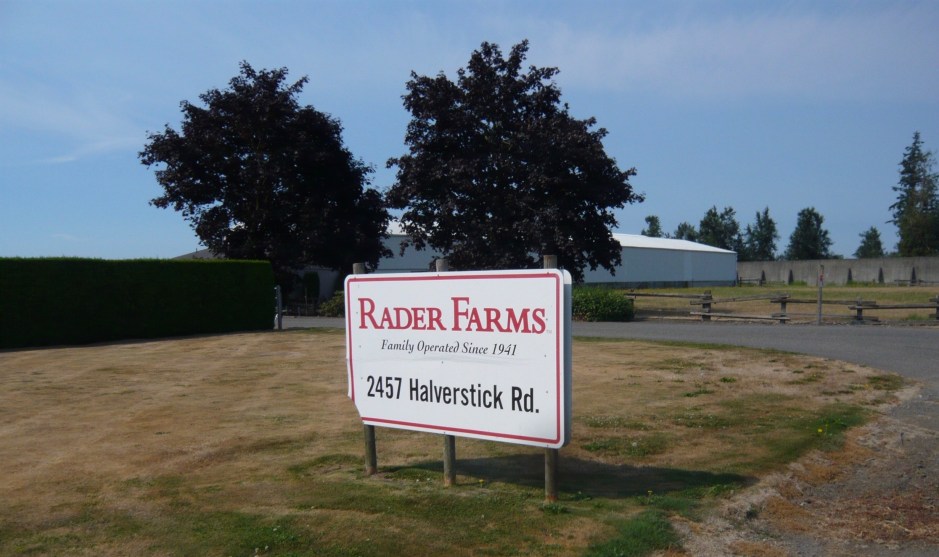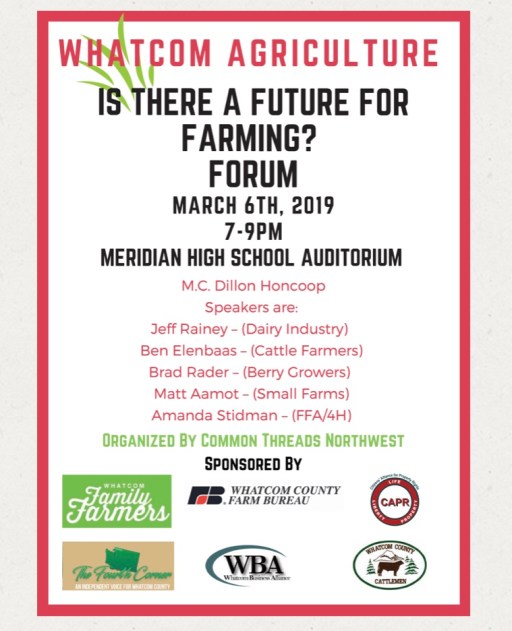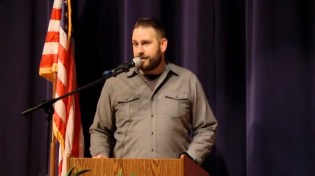
By Sandy Robson
April 12, 2019
A forum featuring a panel of individuals representing local farming interests was held on March 6, 2019, at the Meridian High School auditorium, in Bellingham, Washington.
The forum, “Whatcom Agriculture – Is There A Future for Farming in Whatcom County?” was hosted by Common Threads Northwest, a local conservative organization that was created in early 2015. Common Threads Northwest essentially assumed the role of the Whatcom Tea Party after it became defunct in March of 2017.
The March 6th event was sponsored by Whatcom Family Farmers; Common Threads Northwest; Whatcom County Cattlemen; The Fourth Corner; Whatcom County Farm Bureau; Whatcom County Citizens Alliance for Property Rights; and the Whatcom Business Alliance.

Lynden resident Dillon Honcoop, communications director of Save Family Farming (an affiliate of Whatcom Family Farmers), was the emcee for the forum. Honcoop also hosts the weekly “Farming Show,” talk radio program on KGMI.
Bellingham-based Asset Advisors, LLC, founded by financial planner Dick Donahue, paid to have the forum aired live on KGMI radio. Donahue, who has been active in local conservative politics, is one of the listed directors for Common Threads Northwest.

The March 6th forum featured a panel of five individuals representing the local agricultural community. One of the panelists was Brad Rader, known in Whatcom County as a berry grower, who according to LinkedIn, is the VP/GM at Rader Farms in Lynden, Washington. Rader Farms is known for growing both raspberries and blueberries.
Rader, who is also president of Whatcom Family Farmers, told the forum attendees:
“We feel like, is there, do folks really want us to be here? Um, that’s, that’s a real challenge, and that’s a real concern. That’s why we are questioning, what the heck are we doin’? And we see it, we hear it, we talk about it, and that’s why we put together Whatcom Family Farmers and these other groups, so we can discuss it and, and, um, brainstorm.”
In his explanation of the idea behind the creation of “Whatcom Family Farmers and these other groups,” Rader left out some important parts of the story.
Whatcom Family Farmers, a public relations creation
The farm advocacy entity, Whatcom Family Farmers, was created by local public relations consultant, Gerald Baron, after an E. coli outbreak at the Milk Makers Fest held at the Northwest Washington Fairgrounds in Lynden, Washington, April 21-23, in 2015, which was sponsored by Whatcom County Dairy Women. According to Whois.com, two weeks after the E. coli outbreak, the domain Whatcomfamilyfarmers.org was registered by Gerald Baron, on May 7, 2015.

Baron, who has a crisis and emergency communications company, Agincourt Strategies, was hired to manage the public relations crisis that resulted from the E. coli outbreak. He is currently the communications director for Whatcom Family Farmers.
Since 2015, Baron has also created the Whatcom Family Dairy Farmers, Save Family Farming, Skagit Family Farmers, and Eastern Washington Family Farmers (formerly known as Yakima Family Farmers) farm advocacy entities.
Presently, Baron is the executive director of Save Family Farming, which in 2018, launched its campaign called, Farmworker Justice Now (presently known as Protect Farmworkers Now). The campaign was created in response to the farmworker advocacy efforts of the Bellingham-based advocacy group Community to Community Development, and organizing efforts around farmworker rights by the farmworkers’ union Familias Unidas por la Justicia.
Judging from its actions thus far, the so-called Protect Farmworkers Now campaign appears to advocate on behalf of farmers, rather than on behalf of the farmworkers, after which, it was named.
Gerald Baron’s occupation specialty is helping companies deal with crisis and emergency level public relations situations, such as the 1999 Olympic Pipeline accident in Bellingham, which tragically killed 3 youths.
According to Wikipedia: “Baron was a communications contractor for Equilon Enterprises (a joint venture between Texaco and Shell), which was the managing partner for the Olympic pipeline. He was responsible for communicating with the public and the press to assure them that the crisis was contained.”
Baron’s bio listed on an online poster promoting his April 22, 2015, “Crisis Management on the Farm” workshop held at the Northwest Washington Fairgrounds, in Lynden, touts that his crisis communications work also includes the Deepwater Horizon/BP oil spill, the BP Texas City Refinery explosion, and Hurricane Katrina.

Baron uses the farm advocacy entities he created to deliver his crafted messaging, such as how supposedly unnecessary and unfair it is to have stricter regulations imposed on farmers. Whatcom Family Farmers attacked RE Sources for Sustainable Communities, a Bellingham-based environmental non-profit organization, about its efforts to protect clean water.
Whatcom Family Farmers also perpetuated an attack which originated from its affiliate, Save Family Farming (through its so-called Protect Farmworkers Now campaign), that was directed against Community to Community and its director, Rosalinda Guillen for their advocacy efforts in seeking farmworker justice.
Those advocacy efforts include, among other things, working to improve farmworkers’ living and working conditions, health, and occupational safety, as well as educating the public about the current H-2A visa agricultural guestworker program which Community to Community believes is failing those agricultural guestworkers, and is displacing local workers.
What is a family farm?
While Whatcom Family Farmers president, Brad Rader is certainly associated with Whatcom County berry farming, information about his current relationship with Rader Farms was a key piece of information not provided to the public at the March 6th, forum.
On its website, Whatcom Family Farmers states that its group is: “the new, unified voice of Whatcom County’s family farmers. Berry farmers, dairy farmers, potato farmers, beef farmers, vegetable farmers, nut farmers, ornamental farmers–all farmers who are family owned and whose farm provides the family income.”

At the March 6th forum, Dillon Honcoop introduced Brad Rader in the following way: “Whatcom Family Farmers president Brad Rader, is with us tonight, of Rader Farms, longtime farmer in our community here.”
The name “Whatcom Family Farmers” gives the impression that its group is comprised of family-owned farms which, to some degree, is accurate.
However, neither Brad Rader, nor the Rader family, actually own the Rader Farms business. Rader does have extensive experience in farming, but the current status of Rader Farms is not representative of what comes to mind to most people when they think of family farms.
The Economic Research Service (ERS), which is the research arm of the United States Department of Agriculture (USDA), describes what constitutes a family farm in a March 2017 article: “On family farms, the principal operators and their relatives (by blood or marriage) own more than half of the business’s assets—in short, a family owns and operates the farm.”
Rader Farms is owned by a large corporation, the Oregon Potato Company (OPC). According to bloomberg.com, as of September of 2017, Rader Farms Inc. operates as a subsidiary of Oregon Potato Company (OPC), a privately held corporation, which is headquartered in Pasco, Washington. OPC is a grower/processor of potatoes, vegetables and fruits.
Hoovers.com and buzzfile.com both show the estimated annual revenue for OPC to be over $185 million.

Berry cultivation to corporate acquisition
A September 13, 2017, Portland Business Journal article reported that OPC announced that its company acquired Rader Farms’ farming operation and berry processing facility from Inventure Foods (formerly known as Inventure Group) as part of a $50 million, all-cash deal which included the acquisition of the Willamette Valley Fruit Co. that Inventure had originally purchased in 2013 for $9.5 million.
Inventure, then a publicly traded company and leading specialty food marketer and manufacturer, had acquired Rader Farms back in May of 2007. A Reuters article published on May 17, 2007, reported: “Snack foods maker Inventure Group Inc. SNAK.O said it acquired substantially all assets of Rader Farms Inc., a provider of fruit products, for about $21 million in cash.” Through the acquisition, Inventure also became owner of the Rader Farms registered trademark.
In previously researching a lawsuit filed against Rader Farms in 2013 by the Environmental Protection Agency, Searchlight Review came across some reports containing financial details about Inventure and its then-owned business, Rader Farms.
Federal securities laws require publicly traded companies such as Inventure to disclose information on an ongoing basis. Regulatory filings are provided by the companies to the U.S. Securities and Exchange Commission (SEC).
According to a Form 10-Q report for the quarterly period ended June 30, 2007, filed with the SEC, by Inventure Foods, Inc., Rader Farms generated approximately $27 million in 2006 net revenues.”
When OPC acquired Rader Farms from Inventure Foods in September 2017, OPC then became owner of the “business assets” of Rader Farms, “but the property itself remains under ownership of the Rader family,” according to a September 21, 2017 Bellingham Herald article.
Corporate owners lease land for 20-year period
An October 17, 2012, Form 8-K report filed with the SEC by Inventure Foods, Inc., showed that the company (through its then-wholly owned subsidiary Rader Farms, Inc.) had entered into a lease extension agreement with Uptrail Group, LLC, which was comprised of several members of the Rader family. Publicly traded companies must file a Form 8-K with the SEC whenever any “material event,” such as the lease extension agreement referenced above, occurs that might affect the company’s financial condition.
The lease extension agreement extended an agricultural ground lease that was originally entered into back on May 17, 2007 for a 10-year term, for an additional 10 years, until May 17, 2027. That original lease agreement was between Rader Farms Acquisition Corp. (Inventure Group), and four members of the Rader family.
A Form 10-K report (annual report) filed with the SEC by Inventure Foods for fiscal year ended December 26, 2015, showed that Brad Rader, who had been employed as an executive by Inventure, resigned in January 2016. He had first started his employment as vice president/general manager with Inventure Group in 2007 as a result of Inventure’s acquisition of Rader Farms.
According to the Form 10-Q report for the quarterly period ended June 30, 2007 filed with the SEC by Inventure Group, Inc., the original agricultural ground lease leases approximately 696 acres of real property “together with all improvements and structures thereon and all appurtenant rights thereto, including, without limitation, wells, pumps, motors, electrical panels, electrical hookups, water discharge facilities, pipelines, irrigation systems, easements, rights-of-way for ingress and egress, licenses and water rights and privileges.”
The lease terms stipulated that the monthly rent paid to the Rader family would be $43,500.00, which came to $522,000.00 per annum.
The lease further stipulated that beginning on May 18, 2017, the rent would increase to $52,200.00 per month, which came to $626,400.00 per annum.
According to the lease terms, the lessee (Inventure Group/Rader Farms Acquisition Group Corp.) would be responsible for paying property and Water District taxes and assessments, water costs, and utilities.
Conditions in the lease also included the following: “Any and all of Lessor’s rights to extract any groundwater beneath the Premises, use of any irrigation district facilities serving the Premises, and any future allocations of irrigation water from any irrigation district to which the Premises might be entitled during the Lease Term are hereby transferred to Lessee for the Lease Term.”
Brad Rader’s employment as executive with Inventure
When Brad Rader was first hired as VP/GM with Inventure Group in 2007, he was given a 3-year employment agreement.
Rader would receive an annual salary of $200,000 and he would be eligible for bonuses as determined by the Board (or its Compensation Committee) in its discretion. This information was included as an exhibit in a Form 10-Q report for the quarterly period ended June 30, 2007, filed with the SEC by Inventure.
In addition, Rader, as an executive with Inventure, was granted options to purchase 100,000 shares of Inventure’s Common Stock and he was eligible to participate in benefit plans offered by the company, according to his employment agreement. He also would receive a monthly vehicle allowance of $850, and would receive reimbursement for all reasonable and necessary out-of-pocket expenses.
Subsequent to Oregon Potato Company’s acquisition of Rader Farms by Inventure Foods in September 2017, it is unclear whether or not Brad Rader is presently employed in any capacity with OPC. Seeking information and confirmation, Searchlight Review left a voice mail for Rader last month, which was not returned.
Searchlight Review also contacted OPC president Frank Tiegs’ office, via telephone, seeking confirmation on the company’s annual revenue figure and number of employees, along with clarification about its relationship with Rader Farms and Brad Rader. After leaving an initial message inquiry with an OPC employee, a follow-up contact was made, via telephone, a few days later, and Searchlight Review was told that Mr. Tiegs has “no comment.”
It seems contrary to Gerald Baron’s/Whatcom Family Farmers’ framing of family-owned farms to have Brad Rader, as the group’s president, participate in the March 6th forum, when Rader Farms is actually owned by a large corporation, Oregon Potato Company.
It also seems contrary to the crafted image of wholesome family farms associated with Whatcom Family Farmers and its affiliates to have a paid propagandist like Gerald Baron at the helm, whose experience includes crisis communications work for oil companies, and who has demonstrated that he is willing to attack local advocacy organizations such as RE Sources and Community to Community.

